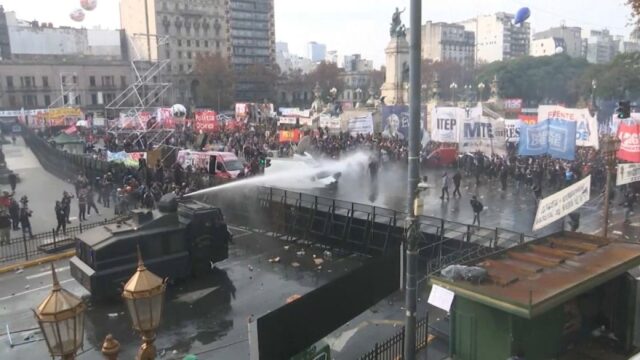Thousands of protesters took to the streets against the minimal approval of the bill known as omnibus proposed by Miley in Argentina.
Las protests They occurred at the moment when the Argentine Senate began to vote on state reform and tax bills proposed by the president Javier Mileyin the most serious test to date of the libertarian leader’s vision of government and change.
The police used water cannons to disperse the protesters. Voting began after hours of debate.
Thousands of riotous protesters blew trumpets, grilled meat on small barbecues and chanted against Milei as they converged in front of Congress in downtown Buenos Aires.
Protesters urged senators to reject Milei’s program of harsh austerity and economic deregulation. Milei came to power with the promise that he would solve Argentina’s worst economic crisis in two decades.
However, his relatively fledgling political party has only one small minority of seats in Congress and it has been difficult for him to reach agreements with the opposition.
Senators voted on two bills on Wednesday, a fiscal package that lowers the income tax threshold and a 238-article state reform bill, initially dubbed ‘omnibus law’ for its more than 600 articles.
What is the controversial ‘omnibus law’ and what does it mean for Argentines?
The Omnibus Law it’s a megaproject presented by the Argentine president Javier Miley. It consists of a package of 664 articles that cover various areas and structural changes. Some key points of this law include:
- Street control: Proposes reforming the Penal Code to increase penalties against protesters and expand the pretexts for police ‘easy triggers’.
- Privatization of state companies: Companies such as Aerolíneas Argentinas, Arsat, trains and Aysa are on the privatization list.
- Politics and elections: Includes the repeal of the Primaries, the implementation of the Single Paper Ballot and changes in the composition of Deputies.
Some sensitive topics, such as healthcare provision by the unions and the privatization of the Argentine national oil company, have been discarded in the hope of reach a compromise.








